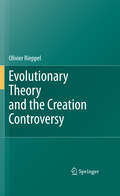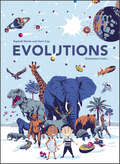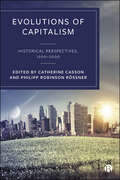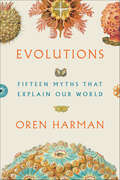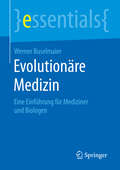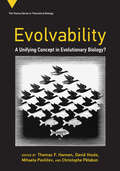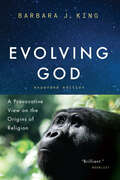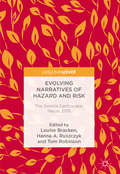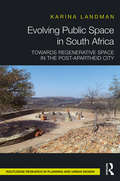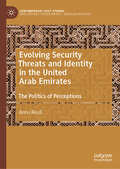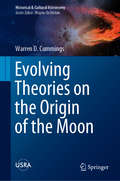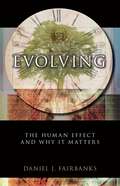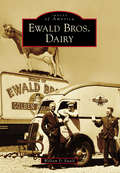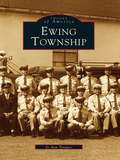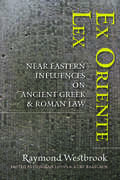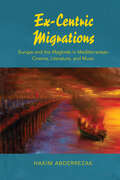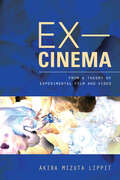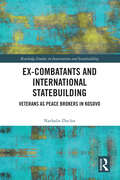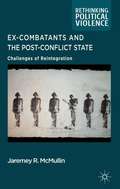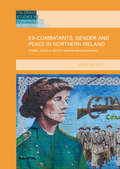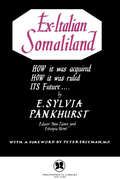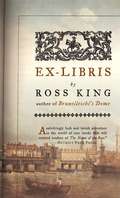- Table View
- List View
Evolutionary Theory and the Creation Controversy
by Olivier RieppelEvolutionary theory addresses the phenomenon of the origin and diversity of plant and animal species that we observe. In recent times, however, it has become a predominant ideology which has gained currency far beyond its original confines. Attempts to understand the origin and historical development of human culture, civilization and language, of the powers of human cognition, and even the origin of the moral and ethical values guiding and constraining everyday life in human societies are now cast in an evolutionary context. In "Evolutionary Theory and the Creation Controversy" the author examines evolutionary theory from a historical perspective, explaining underlying metaphysical backgrounds and fundamental philosophical questions such as the paradoxical problem of change, existence and creation. He introduces the scientists involved, their research results and theories, and discusses the evolution of evolutionary theory against the background of Creationism and Intelligent Design.
Evolutions
by Raphaël Martin Henri CapFrom the first cells to the appearance of humans on Earth, here is the great history of evolution in a single illustrated book. The most recent scientific information is made available to young readers through simple prose, with many anecdotes and concrete examples given by this team of three authors: a journalist, a specialist researcher, and a designer illustrator. From chapter to chapter, the reader understands that each part of his body comes to him from distant ancestors, some of them very surprising, such as archaea, viruses, jellyfish—or even strange fish from the oceans. Everything is clearly explained with the help of small paragraphs and very playful and educational illustrations, which allow children to learn while having fun. Are you ready to go on a journey of over four billion years to unravel the mysteries of evolution, the natural phenomenon that explains the wonderful diversity of the living world?
Evolutions of Capitalism: Historical Perspectives, 1200–2000
by Catherine Casson and Philipp Robinson RössnerThis ambitious collection follows the evolution of capitalism from its origins in 13th-century European towns to its 16th-century expansion into Asia, Africa and South America and on to the global capitalism of modern day. Written by distinguished historians and social scientists, the chapters examine capitalism and its critics and the level of variation and convergence in its operation across locations. The authors illuminate the aspects of capitalism that have encouraged, but also limited, social responsibility and environmental sustainability. Covering times, places and topics that have often been overlooked in the existing literature, this important contribution to the field of economic history charts the most comprehensive chronology of capitalism to date.
Evolutions: Fifteen Myths That Explain Our World
by Oren Harman“An absolute joy to read . . . it is Harman’s skill in blending contemporary science and traditional storytelling that makes this book truly brilliant.” —Randy Rosenthal, New York Journal of BooksWe no longer think, like the ancient Chinese did, that the world was hatched from an egg, or, like the Maori, that it came from the tearing-apart of a love embrace. The Greeks told of a tempestuous Hera and a cunning Zeus, but we now use genes and natural selection to explain fear and desire, and physics to demystify the workings of the universe.Science is an astounding achievement, but are we really any wiser than the ancients? Has science revealed the secrets of fate and immortality? Has it provided protection from jealousy or love? There are those who believe that science has replaced faith, but must it also be a death knell for mythology?Evolutions brings to life the latest scientific thinking on the birth of the universe and the solar system, the journey from a single cell all the way to our human minds. Reawakening our sense of wonder, Oren Harman uses modern science to create new and original mythologies. Here are the earth and the moon presenting a cosmological view of motherhood, a panicking mitochondrion introducing sex and death to the world. Science may not solve our existential puzzles, but like the age-old legends, its magical discoveries can help us continue the never-ending search.“Breathtaking . . . The processes of evolution are at times so huge and ungraspable for the mind—so magical—that they can perhaps only be fathomed through the language of myth . . . Brilliant.” —Karin Altenberg, Wall Street Journal“Harman is a marvelous intellectual companion.” —David B. Green, Haaretz
Evolutionäre Medizin: Eine Einführung für Mediziner und Biologen (essentials)
by Werner BuselmaierWerner Buselmaier erläutert, dass die evolutionäre Medizin den Menschen als Ergebnis einer langen Entwicklung sieht. Diese Betrachtungsweise im Licht der Evolution ist für das Verständnis der Natur des gesunden wie des kranken Menschen von außerordentlicher Bedeutung. Die zunehmende Erkenntnis, dass es zum vollständigen Verständnis einer Krankheit sowohl unmittelbarer als auch evolutionsbiologischer Erklärungen bedarf, wird in allerjüngster Zeit auch in die Medizinerausbildung eingebracht.
Evolvability: A Unifying Concept in Evolutionary Biology?
by Thomas F. Hansen, David Houle, Mihaela Pavličev, and Christophe PélabonEssays on evolvability from the perspectives of quantitative and population genetics, evolutionary developmental biology, systems biology, macroevolution, and the philosophy of science.Evolvability—the capability of organisms to evolve—wasn&’t recognized as a fundamental concept in evolutionary theory until 1990. Though there is still some debate as to whether it represents a truly new concept, the essays in this volume emphasize its value in enabling new research programs and facilitating communication among the major disciplines in evolutionary biology. The contributors, many of whom were instrumental in the development of the concept of evolvability, synthesize what we have learned about it over the past thirty years. They focus on the historical and philosophical contexts that influenced the emergence of the concept and suggest ways to develop a common language and theory to drive further evolvability research. The essays, drawn from a workshop on evolvability hosted in 2019–2020 by the Center of Advanced Study at the Norwegian Academy of Science and Letters, in Oslo, provide scientific and historical background on evolvability. The contributors represent different disciplines of evolutionary biology, including quantitative and population genetics, evolutionary developmental biology, systems biology and macroevolution, as well as the philosophy of science. This pl[urality of approaches allows researchers in disciplines as diverse as developmental biology, molecular biology, and systems biology to communicate with those working in mainstream evolutionary biology. The contributors also discuss key questions at the forefront of research on evolvability.Contributors:J. David Aponte, W. Scott Armbruster, Geir H. Bolstad, Salomé Bourg, Ingo Brigandt, Anne Calof, James M. Cheverud, Josselin Clo, Frietson Galis, Mark Grabowski, Rebecca Green, Benedikt Hallgrímsson, Thomas F. Hansen, Agnes Holstad, David Houle, David Jablonski, Arthur Lander, Arnaud LeRouzic, Alan C. Love, Ralph Marcucio, Michael B. Morrissey, Laura Nuño de la Rosa, Øystein H. Opedal, Mihaela Pavličev, Christophe Pélabon, Jane M. Reid, Heather Richbourg, Jacqueline L. Sztepanacz, Masahito Tsuboi, Cristina Villegas, Marta Vidal-García, Kjetil L. Voje, Andreas Wagner, Günter P. Wagner, Nathan M. Young
Evolve or Die: Hard-Won Lessons from a Hockey Life
by John ShannonFor fans of Michael McKinley&’s Hockey: A People&’s History and Bob Cole&’s Now I&’m Catching On—a book about what&’s changed in hockey, what never should, and a celebration of what we love about the game, from the broadcaster, analyst, and longtime executive producer of Hockey Night in Canada, John Shannon.For decades, Hockey Night in Canada has been the gold standard not just for hockey broadcasts, but for all sports across North America. It shows the stories of the game: on-ice heroics, the love and support of family, small-town values, and big-city lights. Meet the person who shaped that standard. John Shannon was the longtime executive producer of Hockey Night in Canada, starting at the bottom and working his way up through the 1980s and 1990s. He has a unique view of the game and how the way we enjoy it has developed. Technology plays a role, but it&’s about the storytelling—modern-day gladiators and their trials—and hockey provides endless good stories. Shannon&’s world behind the scenes is every bit as colourful and unexpected as what happens on the ice—and just as full of rich characters. From standing up to the Edmonton Oilers&’ mighty Glen Sather to ordering then Prime Minister Pierre Elliott Trudeau to keep out of a dressing room, these stories illuminate the big moments and people that have made the game special. Shannon captures a nostalgia for the great broadcasts of the past—complete with baby blue Hockey Night in Canada blazers—and a pride in how far we&’ve come in improving the game and expanding on the stories we tell. He also shares the keys to a long and successful career: integrity, loyalty, determination, and above all passion. Much has changed in the sport and how we enjoy it, but Shannon&’s career shows that some things must always remain.
Evolving European Perceptions Amidst Asian Neighbours: New Zealand's Merging with the Orient (Palgrave Series in Asia and Pacific Studies)
by David HallThis book identifies the formation, development and changes in New Zealand perceptions of its Asian neighbours, the work of which is based mainly on New Zealand sources—newspaper reports, Government and Parliamentary papers and documents from New Zealand individuals and organisations. The target audience is those with interest in how European perceptions of Asia were formed in the 19th century and Asia's response to those perceptions and how a country with a strong European culture copes with the need to better integrate with Asian neighbours.
Evolving God: A Provocative View on the Origins of Religion, Expanded Edition
by Barbara J. KingReligion has been a central part of human experience since at least the dawn of recorded history. The gods change, as do the rituals, but the underlying desire remains—a desire to belong to something larger, greater, most lasting than our mortal, finite selves. But where did that desire come from? Can we explain its emergence through evolution? Yes, says biological anthropologist Barbara J. King—and doing so not only helps us to understand the religious imagination, but also reveals fascinating links to the lives and minds of our primate cousins. Evolving God draws on King’s own fieldwork among primates in Africa and paleoanthropology of our extinct ancestors to offer a new way of thinking about the origins of religion, one that situates it in a deep need for emotional connection with others, a need we share with apes and monkeys. Though her thesis is provocative, and she’s not above thoughtful speculation, King’s argument is strongly rooted in close observation and analysis. She traces an evolutionary path that connects us to other primates, who, like us, display empathy, make meanings through interaction, create social rules, and display imagination—the basic building blocks of the religious imagination. With fresh insights, she responds to recent suggestions that chimpanzees are spiritual—or even religious—beings, and that our ancient humanlike cousins carefully disposed of their dead well before the time of Neandertals. King writes with a scientist’s appreciation for evidence and argument, leavened with a deep empathy and admiration for the powerful desire to belong, a desire that not only brings us together with other humans, but with our closest animal relations as well.
Evolving Narratives of Hazard and Risk: The Gorkha Earthquake, Nepal 2015
by Tom Robinson Louise Bracken Hanna A. RuszczykThis book presents a range of academic research and personal reflections on the Gorkha earthquake that struck Nepal in 2015. For the first time, perspectives from geography, disaster risk reduction, cultural heritage protection, archaeology, anthropology, social work, health and emergency response are discussed in a single volume. Contributions are included from practitioners and researchers from Nepal and Durham University in the UK, many of whom were in Nepal at the time of the earthquake.Evolving Narratives of Hazard and Risk explores the event of the earthquake, its consequences and its impacts, to provide a holistic and multi-perspective understanding of this special hazard and its significant ramifications for social, political, economic and cultural aspects of life in Nepal. The book highlights how these multiple perspectives are needed to inform each other in order to develop and shape new ways of thinking and interacting with environmental hazards. This collection of works will be of interest to students and academics of Environment Studies, Human Geography and Environmental Policy, and will be of particular relevance to those involved in risk research and managing risk and hazard events.
Evolving Public Space in South Africa: Towards Regenerative Space in the Post-Apartheid City
by Karina LandmanEvolving Public Space in South Africa discusses the transformation of public space highlighted in the country. Drawing on examples from major cities, the author demonstrates that these spaces are not only becoming wasted space, but are also adapting and evolving to accommodate new users and uses in various parts of the city. This process of evolution tends to challenge the more traditional visions and general global views of declining public space in cities and argues that it rather resembles the resilience of these spaces and the potential for regeneration through continuously emerging and mutating forms, functions and meanings. Including over 20 black-and-white images, this book would be beneficial to academics and students of urban planning and design and those interested in the regeneration of cities.
Evolving Security Threats and Identity in the United Arab Emirates: The Politics of Perceptions (Contemporary Gulf Studies)
by Anna ReußThis book examines and conceptualises the determinants of threat perceptions in the United Arab Emirates (UAE) and contributes to a better understanding of how a nation&’s self-conception shapes its perceptions of (in)security and emphasises the relevance of these dynamics for policymaking. It combines the societal approach of the English School of IR with securitization theory to offer a novel framework for analyzing threat perceptions. This book is relevant to students of Middle Eastern studies, gulf studies, international relations, and scholars who are interested in theoretical perspectives.
Evolving Theories on the Origin of the Moon: Studies On The Origin Of The Moon (Historical & Cultural Astronomy)
by Warren D. CummingsThis book follows the development of research on the origin of the Moon from the late 18th century to the present. By gathering together the major texts, papers, and events of the time, it provides a thorough chronicle of the paradigmatic shift in planetary science that arose from the notion that the Earth-Moon system was formed from two colliding planetary bodies.The book covers pre-Apollo ideas, the conceptual evolution during and subsequent to the Apollo explorations of the Moon, and the development of the Earth-Moon system consensus.A plethora of excerpts from key publications are included to demonstrate the shift in scientific focus over the centuries.Through its comprehensive review of lunar science research and literature, this book shows how new technologies and discoveries catalyzed the community and revolutionized our understanding of the Moon’s formation.
Evolving: The Human Effect and Why It Matters
by Daniel J. FairbanksThis persuasive, elegantly written book argues that understanding evolution has never mattered more in human history. The author uses evidence from archaeology, geography, anatomy, biochemistry, radiometric dating, cell biology, chromosomes, and DNA to establish the inescapable conclusion that we evolved and are still evolving. He also explains in detail how health, food production, and human impact on the environment are dependent on our knowledge of evolution. This is essential reading for gaining a fuller appreciation of who we are, our place in the great expanse of life, and the importance of our actions.
Ewald Bros. Dairy (Images of America)
by William EwaldFor nearly 100 years, the Ewald family has been associated with delivering the “world’s finest milk” to families of Minneapolis and surrounding suburbs. In 1886, the 16-year-old Chris Ewald, who had recently emigrated from Denmark with his widowed mother and siblings, secured a position on a milk route to help pay his family’s expenses. Chris eventually purchased the milk route, which is now marked as the beginning of the dairy. Ewald Bros. grew by continuous expansion on the merits of quality dairy products, customer service, and loyalty, eventually becoming the largest home-delivery dairy operation in Minneapolis. With nearly 300 employees, Ewald Bros. quickly became one of the city’s largest employers. Formerly located in North Minneapolis, the company was well recognized for its large two-story creamery covering two city blocks and its bright-yellow milk trucks.
Ewing Township (Images of America)
by Jo Ann TesauroThe origin of Ewing Township is directly attributed to Thomas Hutchinson, an English Quaker who purchased property c. 1676 to help colonize America. By 1687, Hutchinson owned almost thirty percent of today's Ewing Township. In the early days, many settlers were drawn to the area because of its proximity to the Delaware River and its untouched landscape. Once industry arrived, bringing the trolleys and railroads, Ewing began to grow. The vintage photographs Ewing Township depict the progress from the community's early history of dairies, taverns, and a railroad station to its more recent history, which boasts three fire stations, General Motors, and the Trenton-Mercer Airport. Ewing Township will delight the reader with little-known historical facts about the area. Included are the route of Washington's troops on the way to the battle of Trenton and the Revolutionary War soldiers still lurking around West Trenton two hundred years after the battle. Explored are historic buildings, such as the Ewing Presbyterian Church, which was originally built using logs in 1712. This history also glances at the various people who made Ewing Township unique, including Dorothea Dix, who built and later lived in the Trenton Psychiatric Hospital.
Ex Oriente Lex: Near Eastern Influences on Ancient Greek and Roman Law
by Raymond WestbrookAn essential collection of Raymond Westbrook’s groundbreaking work on the cross-cultural history of ancient law.Throughout the twelve essays that appear in Ex Oriente Lex, Raymond Westbrook convincingly argues that the influence of Mesopotamian legal traditions and thought did not stop at the shores of the Mediterranean, but rather had a profound impact on the early laws and legal developments of Greece and Rome as well. He presents readers with tantalizing fragments of early Greek or archaic Roman law which, when placed in the context of the broader Near Eastern tradition, suddenly acquire unexpected new meanings.Before his untimely death in July 2009, Westbrook was regarded as one of the world’s leading authorities on ancient legal history. Although his main field was ancient Near Eastern law, he also made important contributions to the study of early Greek and Roman law. In his examination of the relationship between ancient Near Eastern and pre-classical Greek and Roman law, Westbrook sought to demonstrate that the connection between the two legal spheres was not merely theoretical but also concrete. The Near Eastern legal heritage had practical consequences that help us understand puzzling individual cases in the Greek and Roman traditions. His essays provide rich material for further reflection and interdisciplinary discussion about compelling similarities between legal cultures and the continuity of legal traditions over several millennia.Aimed at classicists and ancient historians, as well as biblicists, Egyptologists, Assyriologists, and legal historians, this volume gathers many of Westbrook’s most important essays on the legal aspects of Near Eastern cultural influences on the Greco-Roman world, including one new, never-before-published piece. A preface by editors Deborah Lyons and Kurt Raaflaub details the importance of Westbrook’s work for the field of classics, while Sophie Démare-Lafont’s incisive introduction places Westbrook’s ideas within the wider context of ancient law.
Ex zitella per Natale (La casata degli Haverstock, libro 4 #4)
by Cheryl BolenSempre pragmatica, lady Caroline Ponsby ha perso ogni speranza di ricevere una proposta di matrimonio da Christopher Perry, un uomo con grandi risorse che adora da quasi due anni. È determinata a non essere più zitella per Natale, e per questo ha invitato un possibile pretendente a passare le feste con la sua famiglia. Sa molto bene che a lord Brockton piacerebbe mettere le mani sulla sua dote, e lei vorrebbe tanto sposarsi e avere una casa e una famiglia sua. La sola idea della sua lady Caroline che si butta via con uno come il vile lord Brockton brucia a Christopher Perry; peccato che non possa offrirsi lui, ma la figlia di un duca è davvero troppo per uno del suo genere, date le umili origini della sua famiglia. Nonostante questo, Christopher partecipa alla festa di Natale a casa del duca di Aldridge con l’intenzione di ostacolare la pessima unione tra lady Caroline e Brockton. Sperando che non sia troppo tardi…
Ex-Centric Migrations: Europe and the Maghreb in Mediterranean Cinema, Literature, and Music
by Hakim Abderrezak“Plunges the reader into a tour de force across radically divergent artistic responses to Mediterranean migration.” —Bulletin of Francophone Postcolonial StudiesEx-Centric Migrations examines cinematic, literary, and musical representations of migrants and migratory trends in the western Mediterranean. Focusing primarily on clandestine sea-crossings, Hakim Abderrezak shows that despite labor and linguistic ties with the colonizer, migrants from the Maghreb (Morocco, Algeria, and Tunisia) no longer systematically target France as a destination, but instead aspire toward other European countries, notably Spain and Italy. In addition, the author investigates other migratory patterns that entail the repatriation of émigrés. His analysis reveals that the films, novels, and songs of Mediterranean artists run contrary to mass media coverage and conservative political discourse, bringing a nuanced vision and expert analysis to the sensationalism and biased reportage of such events as the Mediterranean maritime tragedies.“Ex-Centric Migrations is crucial reading for scholars and students of contemporary Maghrebi, French, and Spanish literatures and cultures. It breaks new ground by encompassing the literature, film, and music of ‘return migration’ and examining the trajectories of Maghrebi migration outside France.” —H-France“Hakim Abderrezak convincingly illustrates how politically committed artistic practices serve to humanize the challenges of human migration, and in the process dramatically improves our understanding of the complex cultural, economic, political, and social realities that shape 21st-century existence.” —Dominic Thomas, author of Africa and France: Postcolonial Cultures, Migration, and Racism
Ex-Cinema: From a Theory of Experimental Film and Video
by Akira LippitWhat does it mean for film and video to be experimental? In this collection of essays framed by the concept "ex-"—meaning from, outside, and no longer—Akira Mizuta Lippit explores the aesthetic, technical, and theoretical reverberations of avant-garde film and video. Ex-Cinema is a sustained reflection on the ways in which experimental media artists move outside the conventions of mainstream cinema and initiate a dialogue on the meaning of cinema itself.
Ex-Combatants and International Statebuilding: Veterans as Peace Brokers in Kosovo (Routledge Studies in Intervention and Statebuilding)
by Nathalie DuclosThis book examines the international efforts to regulate violence in Kosovo since 1999 through the United Nations Mission in Kosovo (UNMIK) and covers 15 years of international presence.The book analyses the process of implementing international policies from a sociological perspective, and looks at the adaptations and arrangements of public policies achieved through the transactions of international actors with local actors, who are at the heart of policy implementation. In particular, it analyses the disarmament, demobilisation, and reintegration of combatants (DDR) programme and shows the extent to which it was co-produced with Kosovo Liberation Army (KLA) leaders co-opted by international administrators. These analyses take the opposite view to the work that considers ex-combatants as spoilers. In Kosovo, the combatant leaders acted as peace brokers, facilitating demobilisation and exercising disciplinary control over rank-and-file combatants. Their position as brokers helped them to take control of the new state being built under international administration. This book shows the importance of the relationship between ex-combatants and the state and illustrates the multiplicity of their possible trajectories, including political ones. To elucidate the dynamics of co-production in shaping DDR policies and hybridising international policies as well as in state formation, the book relies on around a hundred interviews with ex-combatants of the KLA and with international personnel, as well as on the archives of international organisations and observations in the field.This book will be of much interest to students of international statebuilding, peace and conflict studies, Balkan politics and international relations.
Ex-Combatants and the Post-Conflict State
by Jaremey R. McmullinThis book provides a critical analysis of the reintegration challenges facing ex-combatants. Based on extensive field research, it includes detailed case studies of ex-combatant reintegration in Namibia, Mozambique, Sierra Leone, and Liberia.
Ex-Combatants, Gender and Peace in Northern Ireland
by Azrini WahidinThis book explores the contours of women's involvement in the Irish Republican Army, political protest and the prison experience in Northern Ireland. Through the voices of female and male combatants, it demonstrates that women remained marginal in the examination of imprisonment during the Conflict and in the negotiated peace process. However, the book shows that women performed a number of roles in war and peace that placed constructions of femininity in dissent. Azrini Wahidin argues that the role of the female combatant is not given but ambiguous. She indicates that a tension exists between different conceptualisations of societal security, where female combatants both fought against societal insecurity posed by the state and contributed to internal societal dissonance within their ethno-national groups. This book tackles the lacunae that has created a disturbing silence and an absence of a comprehensive understanding of women combatants, which includes knowledge of their motivations, roles and experiences. It will be of particular interest to scholars of criminology, politics and peace studies.
Ex-Italian Somaliland
by E. Sylvia PankhurstEx-Italian Somaliland describes the struggle of Somaliland under the Italian government, who encouraged traffic of slaves, evicted people from their land, and eventually used the colony as a base of aggression against Ethiopia. Estelle Sylvia Pankhurst (May 5, 1882 - September 27, 1960) was a notable campaigner for the suffragette movement in the United Kingdom. She was for a time a prominent left communist who then devoted herself to the cause of anti-fascism, and for peace. In the mid-1920s, Pankhurst drifted away from communist politics but remained involved in movements connected with anti-fascism and anti-colonialism. In 1932 she was instrumental in the establishment of the Socialist Workers' National Health Council. She responded to the Italian invasion of Ethiopia by publishing The New Times and Ethiopia News from 1936, and became a supporter of Haile Selassie. She raised funds for Ethiopia's first teaching hospital, and wrote extensively on Ethiopian art and culture; her research was published as Ethiopia, a Cultural History (London: Lalibela House, 1955). From 1936, MI5 kept a watch on Pankhurst's correspondence. In 1940, she wrote to Viscount Swinton as the chairman of a committee investigating Fifth Columnists, sending him a list of active Fascists still at large and of anti-Fascists who had been interned. A copy of this letter on MI5's file carries a note in Swinton's hand reading I should think a most doubtful source of information. After the post-war liberation of Ethiopia, she became a strong supporter of union between Ethiopia and the former Italian Somaliland, and MI5's file continued to follow her activities. In 1948, MI5 considered strategies for muzzling the tiresome Miss Sylvia Pankhurst. Pankhurst became a friend and adviser to the Ethiopian Emperor Haile Selassie and followed a consistently anti-British stance. She moved to Addis Ababa at Haile Selassie's invitation in 1956, with her son, Richard, (who continues to live there), and founded a monthly journal, Ethiopia Observer, which reported on many aspects of Ethiopian life and development. She died in 1960, and was given a full state funeral at which Haile Selassie named her 'an honorary Ethiopian'. She is the only foreigner buried in front of Holy Trinity Cathedral in Addis Ababa, in the area reserved for patriots of the Italian war.
